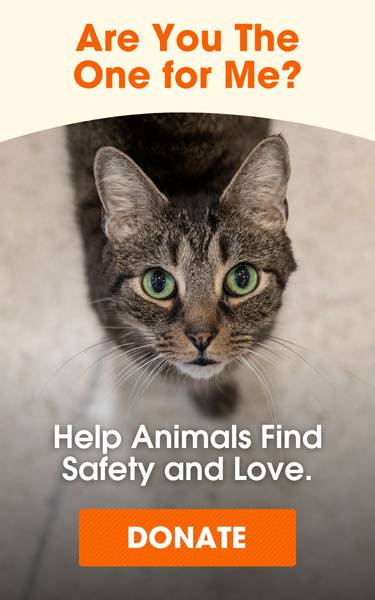
Two Tiny Kittens Represent the ASPCA's Decade of Lifesaving Impact in Los Angeles

When Bruno G. and his wife Sofia visited Seattle Area Feline Rescue (SAFe) to adopt a cat, they immediately noticed a pair of kittens, one black and one white, each about 10 weeks old.
“They ran right up to us,” says Bruno. “We loved that they chose us. We knew we wanted shelter cats. My wife and I have always been pet people, and we instantly fell for these two.”
Sarah Theriault, SAFe’s Adoption Manager, says the kittens, T’Challa and Fiona, were the first cats adopted that Saturday, April 13, upon opening.
“They were here just one night before heading to their new home,” Sarah says.
Humble Origins
On January 31, 2024, a 3-day-old black kitten was admitted to the Baldwin Park Animal Care Center in Baldwin Park, California, after being found by a community member.
“He was our first bottle baby of kitten season, when shelters are flooded with vulnerable, newborn kittens,” says Hella Tyler, the ASPCA’s Senior Manager of Foster Care.

Just days later, on February 9, a tiny white kitten — no larger than a handful of marshmallows — was also admitted to Baldwin Park.
The ASPCA, through its Kitten Foster Program, routinely takes in kittens under 8 weeks old who are too young to be cared for in Los Angeles County Animal Care Centers and places them with foster caregivers. Both T’Challa and Fiona were placed with experienced bottle feeders.
A Decade of Hard Work
The ASPCA has had operations in Los Angeles for 10 years, and our partnership with the L.A. County Department of Animal Care and Control — the largest municipal sheltering system in the country — has resulted in thousands of kittens saved since 2017. To date, we have provided 140,000 spay/neuter surgeries and 45,000 primary pet care appointments at our stationary and mobile clinics; prevented 12,000 kittens from entering crowded county shelters; moved 70,000 animals to other organizations for a better chance of adoption; partnered with city, county and private agencies to supply $10 million in grant funding; surpassed an 80% sterilization rate goal for community cats in a neighborhood pilot; and advocated for stronger animal welfare laws at the local, regional and state level.

“It’s no small undertaking, in one of the largest and most complicated animal welfare environments in the US, to realize the big picture and drive collaboration,” says Jesse Oldham, Senior Director of the APSCA’s Los Angeles Initiative. “We’re grateful to our staff and volunteers who work hard to save and improve the lives of these animals.”
A Shaky Start
Habiba H. has been an ASPCA foster volunteer since 2018. T’Challa is one of the youngest kittens she’s ever taken on.
“His outlook wasn’t great, but within 24 hours he was latching onto the bottle,” Habiba says. “He was easy to care for.”
Habiba named T’Challa for the character in the movie, “Black Panther.”

Before he was 3 weeks old, T’Challa developed an abscess on his right shoulder.
Dr. Bridgid Twomey, Veterinary Program Manager, Los Angeles Feline Initiatives, lanced the abscess on two occasions and prescribed antibiotics.
“At his young age, an infection can be life-threatening,” says Dr. Twomey. “But he healed well.”
For Habiba, who has a cat named Pandora, fostering is a way to provide much-needed care without taking on more resident cats.
“I enjoy their company,” she says.
“Don’t Underestimate Little Kittens”
T’Challa went to his second foster, Shanaka B., in late February, when he required fewer bottle feedings. Though he wasn’t her first, Shanaka says, “Every bottle baby is different no matter the expert you are.”
She says T’Challa’s name fits him perfectly.
“He’s so smart,” Shanaka says. “After a week, he learned how to climb out of his bed in the laundry basket and snuggle up in my arms. He also knows when he does things he’s not supposed to. I always say, ‘Don’t underestimate these little kittens!’”

T’Challa burned off energy with toys and learned to climb stairs. He was soon paired with Fiona, whom Shanaka began fostering on March 9.
“Pairing single kittens when they are young is important for their socialization,” says Tina Fried, Senior Director, Los Angeles Feline Programs.
“They bonded quickly, though T’Challa was a bit of a bully at first,” says Shanaka, who has two cats of her own and has fostered since November 2021. “We separated them sometimes and supervised their play. As Fiona grew, she was able to stand her ground.
“I love the sound of them running around my house,” adds Shanaka, who credits her daughter Alanna, 27, for shouldering much of the work. She considers being able to foster “a big blessing,” despite the emotions that often come with it.
“The hardest part is when I have to say goodbye,” she says. On April 9, that day came.

Three days later, T’Challa and Fiona were flown to Seattle, where we routinely relocate kittens since there is less competition for homes.
“Keepers”
After going to their new home, T’Challa and Fiona adapted quickly to their new surroundings.

“They play a lot and adore each other,” Bruno says. “We live in a townhouse, and they love the stairs. T’Challa’s super smart and Fiona is super amorous.”
For foster caregivers, nothing is more rewarding than knowing their former charges are thriving.

“I knew these kittens were keepers,” says Shanaka. “Bruno and Sofia should be the happiest people in the world.”

Fostering or adopting just one animal helps shelters make room to save another animal. We call that The Rescue Effect.
This month is Adopt a Shelter Cat Month, so there’s no better time to consider participating in The Rescue Effect by adopting your own kitty soulmate or signing up to become a foster caregiver. Visit aspca.org/TheRescueEffect to learn more about how you can make an impact that ripples throughout shelters nationwide!
